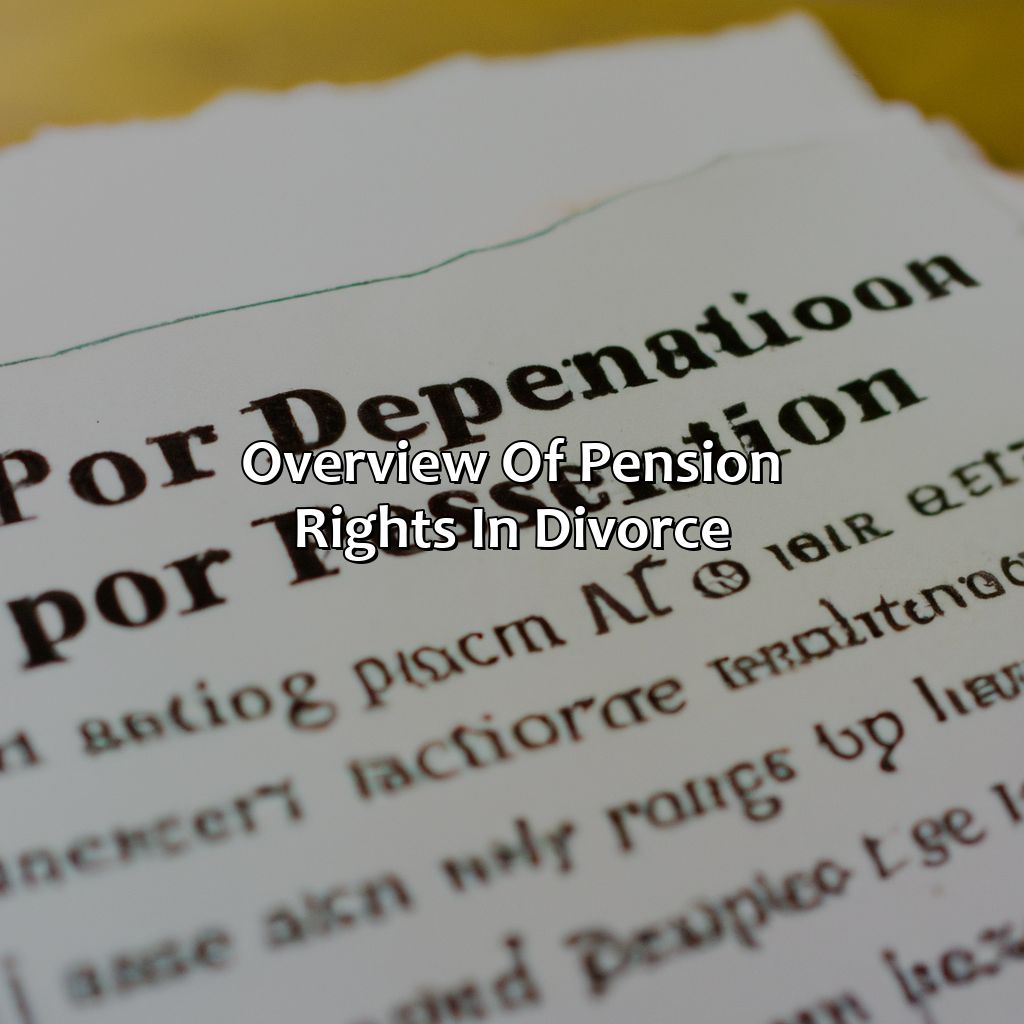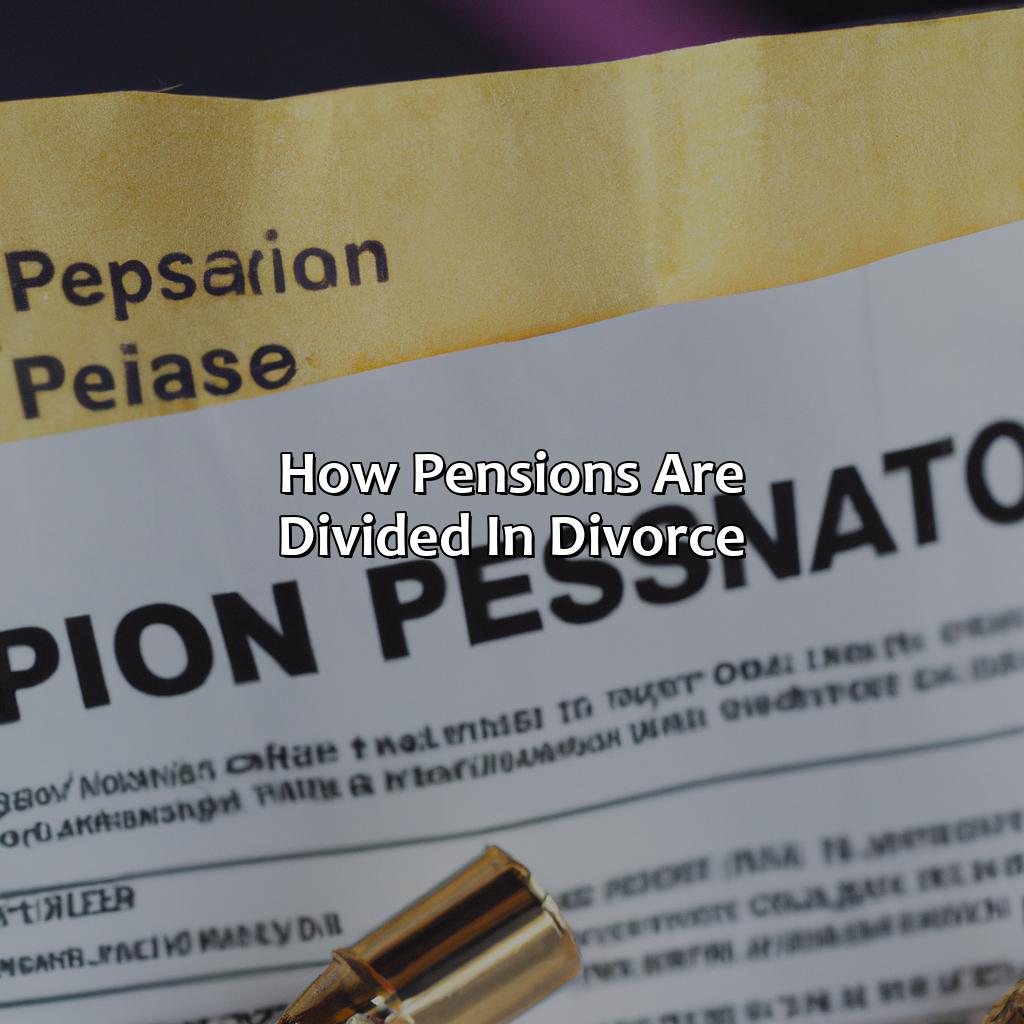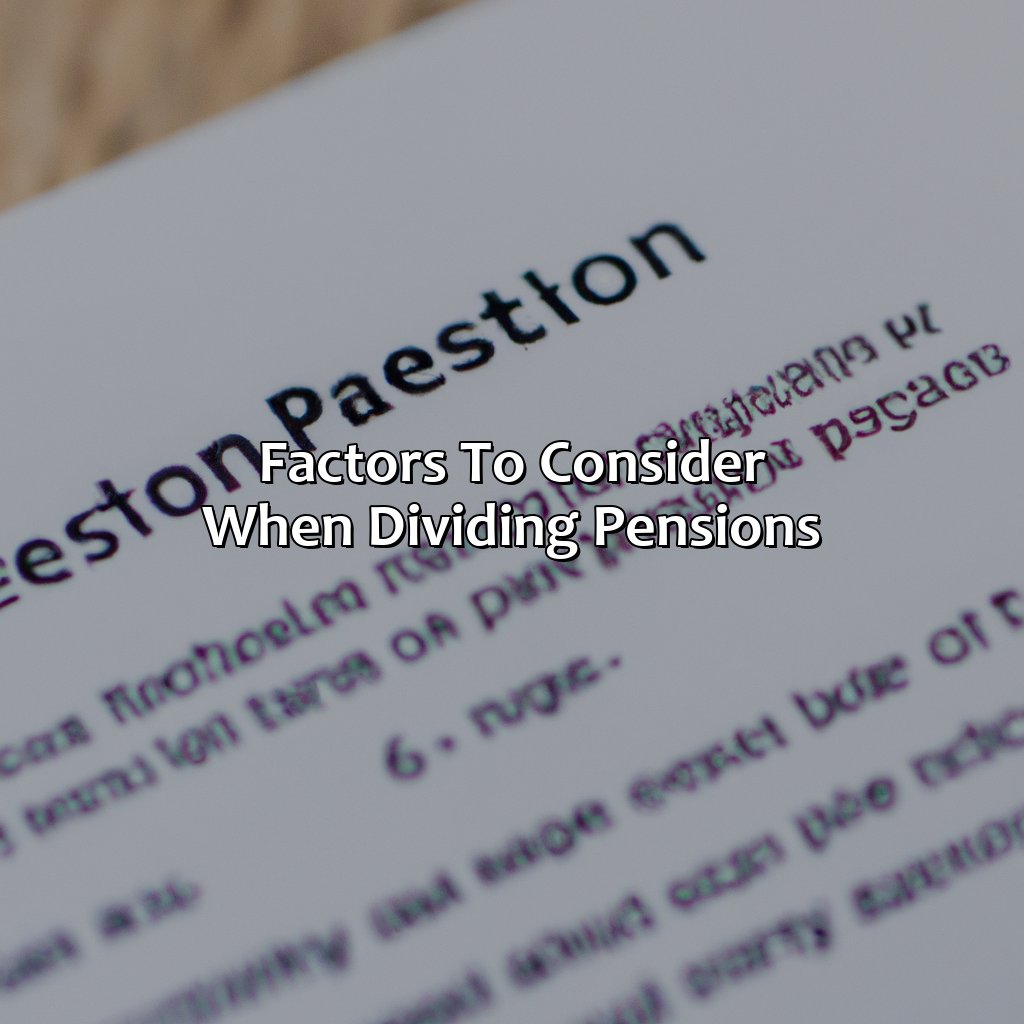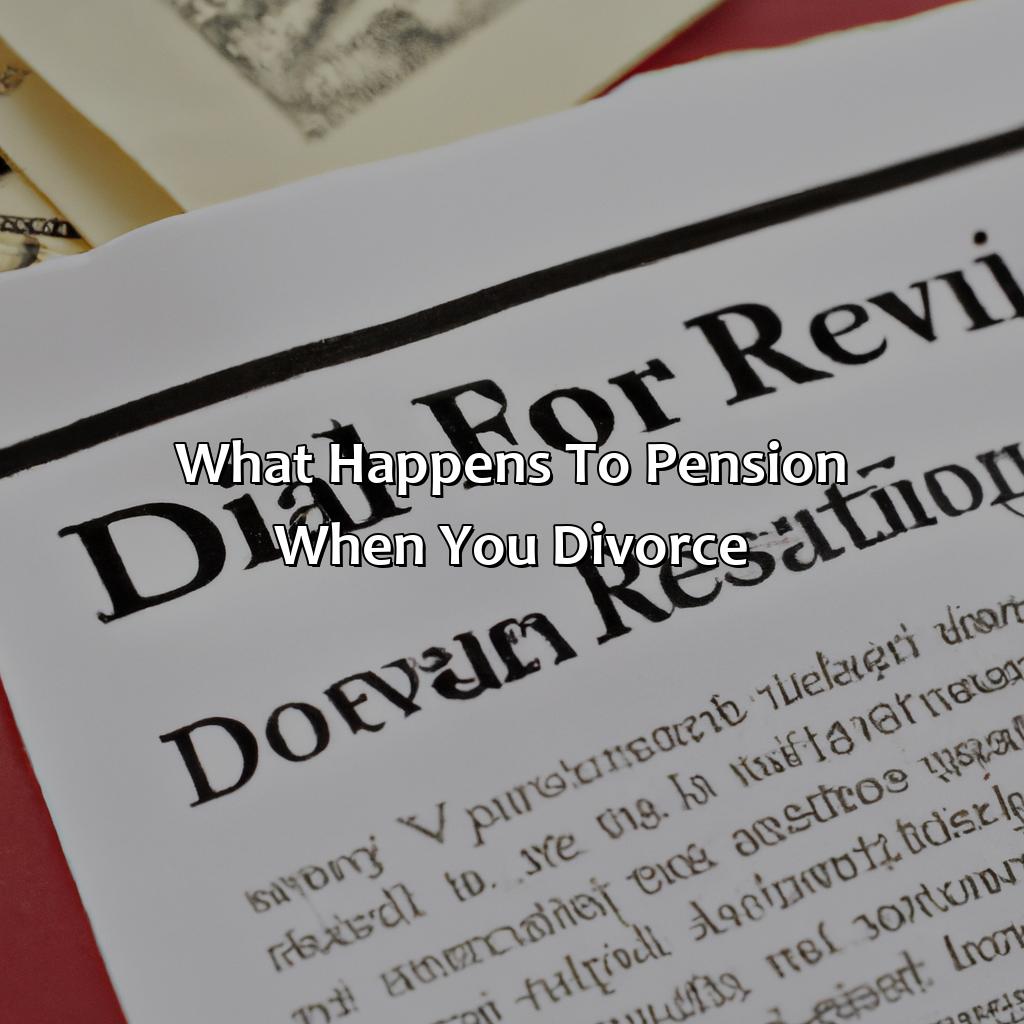What Happens To Pension When You Divorce?
Key Takeaway:
- Divorce can have a significant impact on pension rights: Pensions are considered marital assets and can be subject to division during divorce proceedings. Understanding the different types of pension schemes and division methods is important to ensure a fair and equitable outcome for both parties.
- Pension sharing orders and offsetting are common methods for dividing pensions: Pension sharing orders allow for a portion of the pension fund to be transferred to the spouse’s name, while offsetting involves one partner receiving a larger share of other assets, such as the marital home or savings, in exchange for a smaller share of the pension fund.
- Factors such as age, length of marriage, financial needs, and value of pension funds are considered when dividing pensions: These factors can impact the division method used and the amount of pension each spouse is entitled to receive. Seeking legal advice and guidance from a financial advisor can ensure a fair outcome for both parties.
Are you considering divorce and wondering what will happen to your pension? You don’t have to worry this article will provide guidance on the steps you need to take to make sure your retirement savings stay secure.
Overview of Pension Rights in Divorce
Pension division during divorce can often be a tricky situation to navigate. It is important to have a comprehensive understanding of the different pension schemes and their regulations to ensure a fair distribution. In the event of a divorce, the ex-spouse’s pension rights should be carefully considered before a settlement is reached. The pension sharing order is often the most effective way to divide the pension.
Furthermore, it is crucial to note that not all pensions are treated equally; some may have more rigid policies in place. It is recommended to consult with a financial advisor or legal expert who can provide appropriate guidance on how to stop ex-wife from getting your pension.
Pro Tip: Be aware of the different tax implications when splitting a pension as part of a divorce settlement. Ensure that both parties have a clear understanding of the implications, and seek professional advice if necessary.

Image credits: retiregenz.com by Adam Duncun
How Pensions are Divided in Divorce
Grasping how pensions are divided during divorce? Types of pension schemes, pension sharing orders, offsetting and pension attachment orders exist as solutions. Each gives a special way to split pensions for divorce settlements.

Image credits: retiregenz.com by Yuval Woodhock
Types of Pension Schemes
Various categories of retirement plans exist for employees to ensure financial security post-retirement. Here’s a breakdown of Pension Schemes:
| Type of Pension Scheme | Description |
| Defined Benefit Plan | An employer-related pension plan where employees receive a pre-determined pension amount at retirement |
| Defined Contribution Plan | A retirement planning scheme involving contributions by employers and deductions from employees’ salaries where the final benefit depends on the accumulated fund balance at retirement |
| State-Sponsored Plan | Schemes established or funded by the government as social insurance for citizens. Examples include Social Security in the US, National Insurance contributions in the UK, etc. |
One notable category that wasn’t mentioned earlier is ‘Hybrid Plans’. It’s a combination of defined benefit and defined contribution plans – an example is the Cash Balance Plan. The major difference is that it awards benefits based on salary history and age like a defined benefit plan but uses a method more traditional with DC plans to calculate each year’s payout.
Cases have been reported across nations whereby divorce makes pension division necessary. George and Sophie were married for over two decades when it came crumbling down. During their union, George had worked multiple jobs with various pension schemes, and they owned several businesses together. When dividing assets during divorce proceedings, Sophie sought guidance from legal practitioners to help her share part of George’s pension entitlements as dictated by Her Majesty’s Court & Tribunal Service laws in England without affecting his present value position – which allowed her access to substantial income post-retirement too.
\n
If you’re going through a similar situation, it’s important to know how to value a pension in order to ensure a fair division of assets during the divorce process.
Getting half of your ex’s pension sounds like a sweet deal, until you realize you’re also getting half of their retirement plans to live in a small country cottage with 20 cats.
Pension Sharing Orders
When it comes to divorce, a Pension Splitting Order may be issued by the court to transfer the pension of one spouse to another. Essentially, this means that a portion of the pension rights belonging to one party will be allocated to the other. The aim is to ensure that each spouse has adequate financial support in retirement.
This order can affect both state and private pensions, irrespective of whether they have started paying out or not. It also applies regardless of whether either or both parties contributed towards the pension during their marriage. If you’re wondering how long you have to be married to receive your spouse’s pension, this article can provide helpful information.
To implement this type of order, an agreement must be made regarding how much of the pension each party will receive. For defined benefit pensions (where payouts are based on factors like length of service and salary), this will typically entail taking into account things like projected future payouts and survivor benefits. Once agreed upon, a court order will then instruct trustees on how payments should be divided. If you’re wondering how long after divorce you can claim pension, it’s important to understand the process and requirements before making any decisions.
It is worth noting that in certain situations, couples may agree instead to offset their respective pension entitlements against other assets such as property equity or savings accounts. This option can provide more flexibility than splitting orders but may not always result in an equitable distribution depending on individual circumstances.
In a recent case involving high-net-worth parties with complex assets, it was discovered that one spouse had failed to disclose important details about their pension pots during divorce proceedings. As a result, the judge ordered them to pay almost 3m ($4m) in compensation – showing just how crucial it is for full transparency when dealing with pensions and divorce. If you’re wondering how to calculate pension value for divorce, it’s important to seek professional advice from a financial expert who can assist you in understanding the process.
Divorce may cost you half your pension, but at least you’ll have the satisfaction of knowing your ex won’t be retiring in luxury either.
Offsetting
When considering how to divide pension in divorce, Offset Arrangements are a common choice. This involves offsetting the value of one spouse’s pension against another matrimonial asset, such as property or savings. For example, if one spouse has a significant pension fund, the other may receive a larger share of the family home instead. This can be a more practical and equitable solution than trying to split a pension fund directly.
The benefit of an offset arrangement is that it allows each party to maintain ownership over their respective assets. It also avoids the need for expensive legal fees and complex court proceedings that can arise when trying to split pensions.
It is important to note that entering into an offset arrangement requires careful consideration. Pension values can fluctuate over time, while assets such as property may appreciate or depreciate in value. Professional advice from financial advisors and family law solicitors should always be sought before entering into any agreement.
By taking into account all aspects of your assets when dividing pensions during divorce, you will ensure that both parties are treated fairly and have a secure financial future post-divorce. Don’t leave your financial future up to chance; learn how to keep your pension in a divorce by seeking professional advice today.
Pensions can be as complicated as a Facebook relationship status, but fortunately pension attachment orders can help untangle the mess in a divorce.
Pension Attachment Orders
When a couple decides to divorce, one of the significant questions that come up is how to divide their financial assets. One of the critical assets is the pension fund, which can be divided through a Pension Sharing Order or a Pension Attachment Order.
In a Pension Attachment Order, a share of one spouse’s pension is assigned to the other spouse after retirement. This order depends on the member’s death, and in case they remarry, it can affect the amount paid to their ex-spouse. The court can modify an Attachment Order if either party dies after signing it. Wondering how much of your pension your ex-wife can claim?
It is essential to bear in mind that Pension Attachment Orders only apply to funds earned during marriage; anything gained before marriage will not be affected by this order. Moreover, it may reduce both parties’ pensions, leaving neither with enough during retirement.
To safeguard against possible loss due to an attachment order or to claim ownership of their portion of pension benefits, each spouse should consider signing a prenuptial agreement before getting married.
The solicitor should ensure that both parties understand what an attachment order entails and make ongoing adjustments throughout any significant life changes such as remarriage or new dependants.
Don’t forget to factor in your ex-spouse’s love for expensive avocado toast when dividing pensions.
Factors to Consider when Dividing Pensions
Dividing pensions in a divorce? Consider these factors:
- Age
- Length of marriage
- Financial needs
- Value of the pension funds
This will help you to agree during the process.

Image credits: retiregenz.com by Harry Duncun
Age of the Parties
When it comes to pension division in divorce, the age of both parties plays a significant part in determining how their pensions will be split. The younger the parties are, the more vital it is to consider the potential growth and future value of their pensions. This means that if one party is significantly younger than the other, the division may need to take into account any difference in future earning potential.
Alongside age, the length of time each party has been contributing towards their pensions also needs to be considered. If one person has longer service, they will likely have a larger pension fund and therefore would be entitled to a higher portion of the funds. However, this factor isn’t conclusive as many other considerations come into play during a divorce case.
It’s worth noting that dividing pensions can often result in complex scenarios as all details and individual circumstances differ from case-to-case.
Pro Tip: Seeking legal advice when considering dividing your pension during a divorce is highly recommended to ensure both parties receive a fair outcome. Marriage length doesn’t just determine alimony, it also determines the length of time you’ll spend dividing up that sweet, sweet pension.
Length of the Marriage
The duration of the marital period is a crucial factor when it comes to dividing pension benefits during divorce proceedings. The longer the marriage, the greater the chances that both spouses will have contributed equally to the pension fund. An equal sharing of pension benefits may be in order, taking into account each party’s contributions and earning capacities.
Taking into consideration the length of the marriage, it’s important to note that there are cases where one spouse may have worked for several years before getting married. If such a scenario occurs, then a greater and fairer division of the pension proceeds should be made based on individual contributions towards the plan. If you’re wondering how to calculate lump sum pension payout, there are various factors to consider.
It is worth noting that other factors like health implications, retirement age differences and individual lifestyles might present unique circumstances that require an adjustment of payment terms for either spouse involved in sharing pension benefits.
Pro Tip: A reliable financial advisor can help couples navigate their way around these complex legal matters as they work together through finalizing a fair settlement regarding pensions and finance.
Divorces can be costly, but at least you can split your pension instead of splitting the cost of therapy bills.
Financial Needs of the Parties
When contemplating the separation of assets during a divorce, it’s crucial to recognize and address the financial requirements of both parties. This entails determining not just the current necessities, but also future financial demands that may arise.
It is critical to acknowledge that each party’s needs may differ substantially based on various factors such as income level, age, occupation, and health concerns. Therefore, approaching these considerations with open communication and objective analysis can aid in attaining a fair settlement.
Additionally, assessing the overall financial stability of each party is crucial in determining fair figures regarding pension division or other assets. If one partner will confront significant financial difficulty after separation than another one, then making fair allowances must be considered while dividing these assets.
The interests of both partners can be safeguarded by investing pension funds into approved investment plans or other long-term investment options. These investments should be viewed as part of an individual’s retirement plan rather than as an immediate source of cash during divorce proceedings. By doing so, both post-divorce security and long-term financial independence can be protected.
How to turn your marital problems into a retirement plan: Divorce, the unexpected investment strategy.
Value of the Pension Funds
When dividing pension funds in a divorce, it’s important to determine their overall value. This can be a complex process since pensions can be divided differently depending on the jurisdiction and the type of pension fund. Factors such as the length of the marriage and contributions each spouse made to the pension may also affect how these funds are divided.
One way to determine value is through a Qualified Domestic Relations Order (QDRO). This court order outlines how retirement accounts are divided between spouses based on specific criteria. Additionally, some jurisdictions may use formulas or percentages to divide pensions fairly.
It’s important to note that the value of pension funds may fluctuate over time due to changes in investments or market conditions. To ensure accurate calculations, it’s important to work with a qualified financial planner or attorney who understands how pensions are valued and divided in your region. Understanding commuted value of pension can also help in deciding what happens to pension when you divorce.
Dividing pension funds during divorce can have long-term effects on each spouse s future financial stability. Therefore, it’s essential to consider all factors before making any final decisions regarding division of those assets.
For example, Elizabeth divorced her husband after being married for 15 years and discovered that her husband had started saving for retirement early on in their marriage without her knowledge. With legal help, they were able to accurately determine the value of his retirement account and divide it accordingly, ensuring Elizabeth received her fair share.
Some Facts About What Happens to Pension When You Divorce:
- ✅ Pension is considered a marital asset and is subject to division during a divorce. (Source: The Balance)
- ✅ The amount of pension that can be divided depends on state laws and the terms of the divorce settlement. (Source: Investopedia)
- ✅ Pension benefits can be divided in different ways, such as a lump sum payment or periodic payments to the non-employee spouse. (Source: U.S. Department of Labor)
- ✅ A Qualified Domestic Relations Order (QDRO) is required to divide pension benefits in a divorce. (Source: Pension Rights Center)
- ✅ The process of dividing pension benefits in a divorce can be complex and may require the assistance of a financial advisor or attorney. (Source: Forbes)
FAQs about What Happens To Pension When You Divorce?
What happens to pension when you divorce?
Divorce can have a significant impact on your retirement savings, especially with regard to your pension. Here are some answers to commonly asked questions regarding pensions and divorce.
What is a pension plan?
A pension plan is a retirement savings plan provided by an employer. These plans typically involve an employee contributing a percentage of their salary into a pension fund, which is then invested and grows over time. When the employee retires, they receive a regular payment from the pension fund.
How is a pension divided in a divorce?
In a divorce, a pension is considered a marital asset and is subject to division between the spouses. The division can be done in a number of ways, including a lump-sum payment or regular payments to the non-employee spouse.
What is a Qualified Domestic Relations Order (QDRO)?
A QDRO is a legal order that outlines how a pension plan is to be divided in a divorce. It must be approved by the pension plan administrator, and it is typically required in order for the non-employee spouse to receive a portion of the pension payments.
Can a pension plan be completely protected from being divided in a divorce?
In some cases, a pension can be completely protected from being divided in a divorce if it is considered separate property rather than marital property. This may be the case if the pension was earned prior to the marriage or if it was inherited or gifted to one spouse.
What other factors should be considered when dividing a pension in a divorce?
When dividing a pension in a divorce, other factors that should be considered include the length of the marriage, the amount of contributions made by each spouse to the pension plan, and the future earning potential of each spouse.
